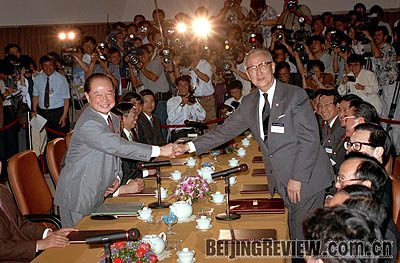|

HISTORIC MEETING: ARATS President Wang Daohan (left) and SEF Chairman Koo Chen-fu made world headlines on April 27, 2003, when they held the highest-level post-1949 cross-straits talks, in Singapore
After nine years, the Chinese mainland's Association for Relations Across the Taiwan Straits and Taiwan-based Straits Exchange Foundation, two nongovernmental organizations authorized to engage in talks on issues related to exchanges across the Taiwan Straits, resumed talks in Beijing on June 12-13, reaching two important agreements. Weekend cross-straits charter flights and mainland tourists crossing the pond to visit Taiwan are now a reality.
The breakthrough talks augur well for the development of relations across the Taiwan Straits and prompted Zhou Zhihuai, Deputy Director of the Institute of Taiwan Studies at the Chinese Academy of Social Sciences, to make several observations on this significant step and the impact going forward, in an article published by China Review News, a Hong Kong-based news agency.
Factors leading to talks
In less than one month after Kuomintang's Ma Ying-jeou took power in Taiwan, the Association for Relations Across the Taiwan Straits (ARATS) and the Straits Exchange Foundation (SEF) managed to resume talks. There were several factors that contributed to this encouraging progress.
First is the recognition of the political foundation for the resumption of ARATS-SEF talks, that is, the "1992 Consensus" on the one-China principle. This is a crucial point. As Hu Jintao, General Secretary of the Central Committee of the Communist Party of China (CPC), stressed in his meeting with Kuomintang Chairman Wu Poh-hsiung in late May that all other problems in mainland-Taiwan relations are open to discussion as long as both sides recognize the one-China principle.
Second is the sense to seize opportunities. During the rule of pro-independence Taiwan leaders Lee Teng-hui and Chen Shui-bian, they had neither the intention nor the ability to improve and develop cross-straits relations. As a result, opportunities were lost for common development and prosperity across the straits. Although some argue it's still too early to say whether Ma Ying-jeou's tenure signifies a "rare window of opportunity" for development in cross-straits relations, the will and actions to do so have become undeniable facts.
Third is the objective demand of progressing cross-straits relations and the mainstream public opinion. Whether it is from the perspective of the mainstream public opinion on both sides of the Taiwan Straits or the expectations of the international community, the resumption of ARATS-SEF talks will help stabilize cross-straits relations and maintain peace and stability in the Asia-Pacific region. In the process of cross-straits exchanges, particularly in economic cooperation, many problems are waiting to be solved. By the end of 2007, there had been over 47 million arrivals of Taiwan tourists to the mainland, the indirect mainland-Taiwan trade had accumulatively topped $700 billion and the number of Taiwan businesses' investment projects on the mainland had surpassed 75,000. The resumption of talks between ARATS and SEF will further boost cross-straits economic cooperation.
Fourth is the huge potential economic benefits of enhanced mainland-Taiwan economic cooperation. According to Taiwan authorities' estimates, if the agreements on weekend cross-straits charter flights and mainland tourists' visit to Taiwan can be smoothly implemented in July, the profits garnered in relevant industries and services in Taiwan are expect to counteract the side effects brought by the retail fuel price hike in June and Taiwan's economy would see an initial turnaround.
Mature talk environment
Since the 17th CPC National Congress in October 2007, Party and state leaders have given priority to the work concerning Taiwan. Senior leaders' enthusiastic involvement in this work helps lay a solid foundation for opening a new chapter in cross-straits relations. Especially in 2008, CPC General Secretary Hu Jintao's meetings with high-ranking political figures from Taiwan, including Vincent Siew, Lien Chan and Wu Poh-hsiung, show the mainland's sincere will to improve and develop cross-straits relations and create a good atmosphere for interaction across the straits.
After the March 22 "presidential" election in Taiwan, calls for closer mainland-Taiwan relations have been on the rise in the island. Continuous high-level interaction across the straits further increases mutual trust. After the 8.0-magnitude earthquake struck Wenchuan County in southwest China's Sichuan Province on May 12, Taiwan compatriots show their compassion for quake victims, accelerating the reconciliation and integration across the straits.
High-ranking Taiwan political figures' successive visits to the mainland won the support and recognition of the mainstream public that supports the peaceful development of cross-straits relations. During then Kuomintang Chairman Lien Chan's visit to the mainland in 2005, pro-independence forces in Taiwan accused Lien of selling out Taiwan, and some "Taiwan independence" activists even tried to block Lien's car on the way to the airport before his departure. Worse still, there were even bloody conflicts between Lien's proponents and opponents at the airport. The failure of the pro-independence Democratic Progressive Party in Taiwan's recent "legislative" and "presidential" elections shows that the majority of Taiwan people do not support the party's confrontational policies toward the mainland over the past eight years. The growing demand for the development of cross-straits relations in Taiwan is boosting the reconciliatory atmosphere.
| 